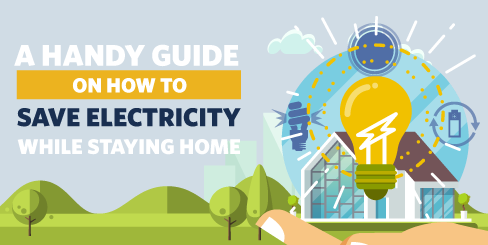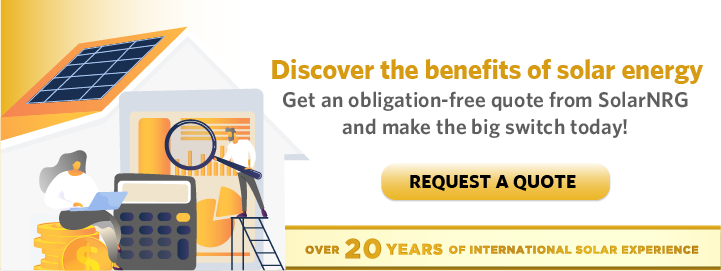Most of us are working from home during this trying time. While this keeps us safe, the downside is we consume more energy, which inevitably results in a higher electricity bill. The good news is that there are many different ways to save electricity and keep the bills down, especially since we all can use that extra budget for other household expenses.
Learn how to save electricity using practical, easy-to-follow, and proven tips from this infographic.

How to Save Electricity at Home
1. Switch to LED bulbs
On average, 5% of your household’s energy consumption goes to lighting. That said, using energy-efficient light bulbs is a surefire way to bring down your electricity bills.
Among the many types of light bulbs, light-emitting diode (LED) bulbs are the most energy-efficient. For comparison, fluorescent lamps can last as long as 10,000 hours, while LED lamps can last 10 times longer. They also have a more focused light direction at 180 degrees than the 360 degrees of fluorescents, meaning they use a more efficient system to distribute emitted light.
How energy efficient are LEDs? Their energy consumption is way lower than traditional light bulbs, allowing you to use 25% to 80% less electricity.
2. Utilize natural light
During the daytime, it is best to open all windows and blinds and crimp the curtains. This way, you don’t need to turn on electrical lights or your desk lamp as the intensity of natural light will be enough for your needs; not to mention, you’re getting a free dose of Vitamin D to enhance your mood and strengthen your immune system.
Plus, open windows allow the air to circulate freely around your house, making it feel less stuffy.
3. Go solar
Solar panels for homes may seem expensive to install, but once set up, your home will be able to harness the power of the sun for practically free electricity, making it a worthwhile investment. Solar panel systems are designed to send your household’s surplus electricity back to the national electrical grid, which would offset your commercial electricity consumption through net metering.
Besides, solar panels have a lifespan of about 25 years or more before they need any replacing, extending the time that you can reap the benefits of low monthly electricity bills.
4. Do chores manually
House chores are necessary to maintain cleanliness and order at home. However, electrical appliances like vacuum cleaners can consume a great deal of energy. It would help you conserve energy by using cleaning tools that don’t require electricity, such as the good-old broom.
If you have carpets at home, you can have them cleaned without using a vacuum cleaner—go for those handy manual carpet sweepers to get rid of pet hair or food crumbs.
Another tip: Natural defrosting of your fridge is also more energy-efficient than using an electric fan or other heating gizmos. This also applies to thawing frozen food before cooking.
5. Use smart devices
Technology can be a helpful tool for lowering power consumption at home.
Since plugged-in appliances use energy even when they’re not running, known as “vampire load,” it is advisable to use smart power strips. Unlike conventional ones, smart power strips can detect if appliances are on standby and cut power when they’re not in use.
You can also tweak the standard settings of your air-conditioning unit by using voice-activated personal assistants to control your home cooling system’s thermostat.
6. Use energy-saving appliances
Energy-saving appliances come in all forms, from TVs to refrigerators and air-conditioners. They use less energy to function and automatically go on low-power mode when not in use.
It may be wiser to replace your old refrigerator or washing machine with a new, energy-saving model. Old appliances are prone to mechanical breakdowns, which can add to your expenses or lead to a never-ending cycle of costly repairs. Electricity savings can offset the money that you’ll spend for the purchase of new appliances.
7. Seal air leaks
Maintain a cool temperature at home by ensuring that windows and doors have no cracks or openings where air can escape. There are many seal strips that you can get commercially, or you can DIY them, to seal air spaces and prevent your air-conditioner from working for long hours before you can achieve the desired temperature for your home.
8. Have your air conditioner cleaned regularly
Air-conditioning filters collect dust, dirt, and grime over time, putting a strain on the unit’s cooling system. The dirtier your air conditioner is, the longer time it will need to cool the room or house, which would require more electrical power to function well.
Blocked filters can increase your unit’s power consumption between 5% and 15%, so make sure to have your air-conditioner cleaned every month or two, depending on how dusty or polluted the environment is or how often you use it. You can contact air-conditioning cleaning services if you don’t have the tools to clean hard-to-reach areas effectively.
9. Cover pots when cooking
If you’re using an electric stove, placing a lid on pots and pans will save you energy because they lock in the heat. Water will boil, and meat will become tender faster, reducing the time you need to keep your electric stove running.
10. Set the right temperature for different home areas
Warm weather will naturally have you using your air conditioner in several areas around the home simultaneously. While this will make you feel comfortable, it can be costly, although not as much if you set the air conditioner at the right temperature.
Perhaps the whole family gathers more often in the living room; in that case, you may want to make it cooler than the other parts of your home while putting the air conditioning in the bedrooms in low-power mode. Another good practice is to turn the thermostat down after midnight since it will be comfortably cooler by then.
11. Use PC sleep mode
A desktop or laptop that is turned on consumes 65 watts of power versus 6 watts when you switch it to sleep mode. Rather than leaving it on when not in use and as you take care of other chores, it may also be better to put it on hibernate mode, as it won’t use any power at all.
12. Limit kids’ gadget time
Fewer hours of video streaming on the laptop or gaming on consoles can save a lot on your energy bill. Also, remind your children frequently not to leave their devices or gadgets powered on when not in use, as they may leave them like this more often than not.
13. Switch off idle appliances
Once you finish a task on your computer and plan to do another chore, which will require you to be away for an indefinite period, shut the machine down and pull out the AVR plug. Don’t forget all the other appliances that you use with it—the fan or air conditioner, light, radio and speakers, and so on. This good habit can save you heaps.
14. Follow a laundry schedule
A whole week’s worth of laundry versus half-loads will use the same amount of electricity in your washer, so you might as well schedule your laundry weekly. Aside from saving electricity, you also save water.
If you can help it, avoid using the dryer since it lets you consume extra electricity when you can go for line drying instead. If you need to use a dryer on rainy days, see to it that nothing restricts the airflow, like coins or cloth fibers, as these will force your appliance to run longer.
15. Use kitchen appliances properly
The kitchen is one of the busiest places at home, which means a lot of energy is being used here. To save energy in the kitchen, be mindful of a few things:
-
- Fill your electric kettle with only the right amount of water you need—the less water you heat, the less energy it has to use.
- Use the microwave, not the electric stove, when heating small amounts of food.
- Avoid opening the fridge too often. If you keep opening and closing the refrigerator door, it will need a lot of power to cool up its interior and maintain its set temperature.
Technology for Energy Efficiency
Technology like solar panels is here for a reason—to make our lives easier and help us live in the best way possible. Wiring your home with a solar panel system lets you use energy efficiently while helping you save on electricity costs. Learn more about solar technology—contact SolarNRG for the purchase and installation of solar panels for residential, commercial, or industrial use.


Recent Comments